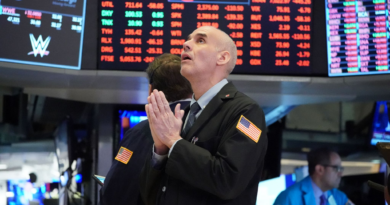VCs backing Kamala Harris are ‘trying to buy the right type of risk’
Being a venture capitalist carries a lot of prestige in Silicon Valley. Those who choose which startups to fund see themselves as fostering the next big waves of technology.
So when some of the industry’s biggest names endorsed former President Donald Trump and the onetime VC he picked for a running mate, JD Vance, people took notice.
Then hundreds of other VCs — some high profile, others lesser-known — threw their weight behind Vice President Kamala Harris, drawing battle lines over which presidential candidate will be better for tech innovation and the conditions startups need to thrive. For years, many of Silicon Valley’s political discussions took place behind closed doors. Now, those casual debates have gone public — on podcasts, social media and online manifestos.
Venture capitalist and Harris backer Stephen DeBerry says some of his best friends support Trump. Though centered in a part of Northern California known for liberal politics, the investors who help finance the tech industry have long been a more politically divided bunch.
“We ski together. Our families are together. We’re super tight,” said DeBerry, who runs the Bronze Venture Fund. “This is not about not being able to talk to each other. I love these guys — they’re almost all guys. They’re dear friends. We just have a difference of perspective on policy issues.”
It remains to be seen if the more than 700 venture capitalists who’ve voiced support for a movement called “VCs for Kamala” will match the pledges of Trump’s well-heeled supporters such as Elon Musk and Peter Thiel. But the effort marks “the first time I’ve seen a galvanized group of folks from our industry coming together and coalescing around our shared values,” DeBerry said.
“There are a lot of practical reasons for VCs to support Trump,” including policies that could drive corporate profits and stock market values and favor wealthy benefactors, said David Cowan, an investor at Bessemer Venture Partners. But Cowan said he is supporting Harris as a VC with a “long-term investment horizon” because a “Trump world reeling from rampant income inequality, raging wars and global warming is not an attractive environment” for funding healthy businesses.
Several prominent VCs have voiced their support for Trump on Musk’s social platform X. Public records show some of them have donated to a new, pro-Trump super PAC called America PAC, whose donors include powerful tech industry conservatives with ties to SpaceX and Paypal and who run in Musk’s social circle. Also driving support is Trump’s embrace of cryptocurrency and promise to end an enforcement crackdown on the industry.
Although some Biden policies have alienated parts of the investment sector concerned about tax policy, antitrust scrutiny or overregulation, Harris’ bid for the presidency has reenergized interest from VCs who until recently sat on the sidelines. Some of that excitement is due to existing relationships with Silicon Valley that are borne out of Harris’ career in the San Francisco area and her time as California’s attorney general.
“We buy risk, right? And we’re trying to buy the right type of risk,” Leslie Feinzaig, founder of “VCs for Kamala” said in an interview. “It’s really hard for these companies that are trying to build products and scale to do so in an unpredictable institutional environment.”
The schism in tech has left some firms split in their allegiances. Although venture capitalists Marc Andreessen and Ben Horowitz, founders of the firm that is their namesake, endorsed Trump, one of their firm’s general partners, John O’Farrell, pledged his support for Harris. O’Farrell declined further comment.
Doug Leone, the former managing partner of Sequoia Capital, endorsed Trump in June, expressing concern on X “about the general direction of our country, the state of our broken immigration system, the ballooning deficit, and the foreign policy missteps, among other issues.” But Leone’s longtime business partner at Sequoia, Michael Moritz, wrote in the Financial Times that tech leaders supporting Trump “are making a big mistake.”
Shaun Maguire, a partner at Sequoia, posted on X that he donated $300,000 to Trump’s campaign after supporting Hilary Clinton in the 2016 presidential election. Federal Election Commission records show that Maguire donated $500,000 to America PAC in June; Leone donated $1 million.
“The area where I disagree with Republicans the most is on women’s rights. And I’m sure I’ll disagree with some of Trump’s policies in the future,” Maguire wrote. “But in general I think he was surprisingly prescient.”
Feinzaig, managing director at venture firm Graham & Walker, said that she launched “VCs for Kamala” because she felt frustrated that “the loudest voices” were starting to “sound like they were speaking for the entire industry.”
Much of the VC discourse about elections is in response to a July podcast and manifesto in which Andreessen and Horowitz backed Trump and outlined their vision of a “Little Tech Agenda” that they said contrasted with the policies sought by Big Tech.
They accused the U.S. government of increasing hostility toward startups and the VCs who fund them, citing Biden’s proposed higher taxes on the wealthy and corporations and regulations they said could hobble emerging industries involving blockchain and artificial intelligence.
Vance, a U.S. senator from Ohio who spent time in San Francisco working at Thiel’s investment firm, voiced a similar perspective about “little tech” more than a month before he was chosen as Trump’s running mate.
“The donors who were really involved in Silicon Valley in a pro-Trump way, they’re not big tech, right? They’re little tech. They’re starting innovative companies. They don’t want the government to destroy their ability to innovate,” Vance said in an interview on Fox News in June.
Days earlier, Vance had joined Trump at a San Francisco fundraiser at the home of venture capitalist and former PayPal executive David Sacks, a longtime conservative. Vance said Trump spoke to about 100 attendees that included “some of the leading innovators in AI.”
DeBerry said he doesn’t disagree with everything Andreesen Horowitz founders espouse, particularly their wariness about powerful companies controlling the agencies that regulate them. But he objects to their “little tech” framing, especially coming from a multibillion-dollar investment firm that he says is hardly the voice of the little guy. For DeBerry, whose firm focuses on social impact, the choice is not between big and little tech but “chaos and stability,” with Harris representing stability.
Complicating the allegiances is that a tough approach to breaking up the monopoly power of big corporations no longer falls along partisan lines. Vance has spoken favorably of Lina Khan, who Biden picked to lead the Federal Trade Commission and has taken on several tech giants. Meanwhile, some of the most influential VCs backing Harris — such as LinkedIn co-founder Reid Hoffman; and Sun Microsystems co-founder Vinod Khosla, an early investor in ChatGPT-maker OpenAI — have sharply criticized Khan’s approach.
U.S. Rep. Ro Khanna, a Democrat whose California district encompasses part of Silicon Valley, said Trump supporters are a vocal minority reflecting a “third or less” of the region’s tech community. But while the White House has appealed to tech entrepreneurs with its investments in clean energy, electric vehicles and semiconductors, Khanna said Democrats must do a better job of showing that they understand the appeal of digital assets.
“I do think that the perceived lack of embrace of Bitcoin and the blockchain has hurt the Democratic Party among the young generation and among young entrepreneurs,” Khanna said.
Naseem Sayani, a general partner at Emmeline Ventures, said Andreessen and Horowitz’s support of Trump became a lightning rod for those in tech who do not back the Republican nominee. Sayani signed onto “VCs for Kamala,” she said, because she wanted the types of businesses that she helps fund to know that the investor community is not monolithic.
“We’re not single-profile founders anymore,” she said. “There’s women, there’s people of color, there’s all the intersections. How can they feel comfortable building businesses when the environment they’re in doesn’t actually support their existence in some ways?”


